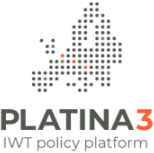Executive summary
This deliverable is providing follow-up of the PLATINA3 deliverable on competences to operate on board systems allowing for automation of inland vessels and of the PLATINA3 deliverable on refresher classes for automated vessel operation, respectively the PLATINA3 deliverables D3.3 and D 3.4.
Within the consortium, experts from international organisations in charge of safety of transport on inland waterways, social partners and education institutes tried to propose what could be the best way to deal with future competences of the personnel related to the remote-controlled craft: both on board these craft and in the remote control centres.
This report shows how the PLATINA3 deliverables for new / future competences can be concretely integrated into the CESNI standards.
This report recalls the dialogue between the scientific research carried out within PLATINA3 and the transformation of this research into European-wide usable technical standards.
This report provides:
- the methodology used in CESNI/QP to use the PLATINA3 input and make it an applicable standard;
- a collection of the first feedbacks and questions of principle that remain to be discussed;
- a possible approach for the future, including draft standards for practical examination for relevant qualifications identified by CESNI experts (to be submitted to CESNI).
This report shows that the first stage of receipt of PLATINA3 deliverables by CESNI/QP is positive and conclusive.
Initial very cursory reviews (and in English) and more in-depth analysis by Member State experts from CCNR and EU Member States carried out after receipt of a German, French and Dutch version of the standards for Remote Control Center Operator (RCCO) and for personnel on board a remotely controlled craft have raised important questions of principle that the CESNI/QP working group will have to deal with. These questions will need to be considered as a whole, as there is a very strong cross-cutting issue. Feedback from other bodies will be required.
These draft standards have already fed the reflections for the working group that is working on the manning standards and that will also have to integrate these new roles in the manning tables.
In general, it can be said that results and findings from PLATINA3 give both a very concrete approach with the proposal of competence tables but also paves the way for future reflections that will have to be done to consolidate the new competences. They contributed to a certain awareness of the global challenges that CESNI/QP will work on in the coming years. A next element for examination in CESNI/QP context, which however should only be carried out once general questions on the tasks of the RCCO and personnel on board the remotely controlled craft have been examined and clarified in more depth, is the draft standard for practical examination for RCCO and personnel on board the remotely controlled craft, which is attached to this report as annex 2.

